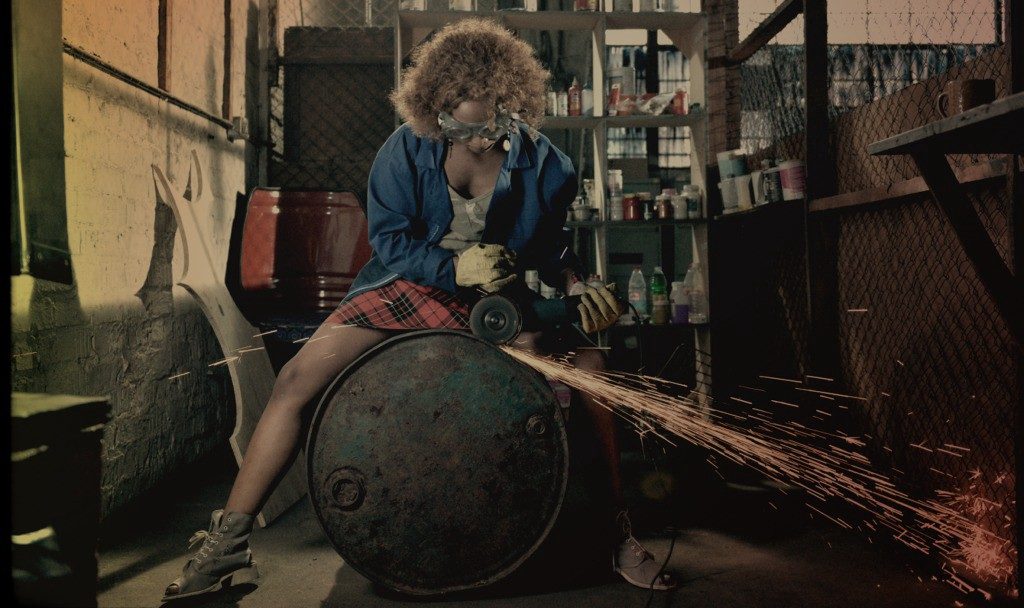a
I’ve always wanted to make feature films. I feel that making
documentaries and TV dramas was a valuable way of learning to do this, as was being
a mother. Some people do make features without having lived very long or very
deeply. I don’t know how they do this. I couldn’t, because although I am a white, middle-aged English-speaking South African woman whose films are mostly about young, black kids, I make films about what I have learned and experienced in
life.
In many ways, I’ve made all three of my feature films for my
family. “Otelo Burning,” my first feature film, was made for my children, who
were born just as Apartheid was dying. It is a story about freedom — about what
freedom costs, but perhaps more importantly, about what happens when you actually
get freedom. This is something I want
them to understand.
“Ayanda,” which will be releasing in the U.S. on November 13 by the film distributor Array, was made more specifically for my
daughters. This film tells the
story of a 21-year-old Afro-hipster who has a knack for taking neglected
pieces of furniture and “bringing them back to love.” Eight years after her
father’s death, she is determined to revive his prized garage business, which
is in deep debt and in danger of being sold. Inspired by the possibilities of a
modern African aesthetic, “Ayanda” explores the core theme of how we let go of the
things and people we love.
In this film, I wanted
to present a new role model to my daughters — one that would allow them to
consider new options and possibilities for their own lives. I wanted to
showcase a young woman, an entrepreneur, who succeeded by engaging,
rather than avoiding, her own issues while at the same time not compromising
her own passion, originality or style.
For me, like many other female directors, the greatest
challenge is to find work. Up until recently, I’d never directed anything that I
didn’t create and produce so that I could
direct, but in many ways I feel this has compromised my directing. Producing and directing are tasks that
should be separated rather than performed by the same person, because it’s
often within the conversations between the two roles that creativity is
supported. For the first time in my
life, now that I am nearing 50 and have made two successful films, I was
finally hired as a director to simply direct and not also produce a film.
Much like “Ayanda,” “Dis Ek Anna” is the story of a strong woman.
It tells the story of an abused child who decides to murder her abuser. A courtroom drama, the film then unpacks the
moral and legal implications of her actions in a country where 1 out of every 3
woman has been abused. If I made my
other two films for my children, “Dis Ek Anna” was made for my mother who, as a
child, was abused by her uncle. The film has just been
released in South Africa.
For many years, South African filmmakers have felt the need
to shape their films to appeal to foreign audiences. We chose to try and
emulate Hollywood rather than to explore our own voices. This diluted the
integrity and power of the narratives and diminished what is unique and
compelling about them.
However, recently, following the successes of films like “Tsotsi,” “Beauty”
and “District Nine,” this is changing. A new group of young filmmakers — many
of us who honed our skills on the streets of violence-wracked townships and
serial TV programs, and several of us who are women — are now telling our own
stories in our own way. This is both more direct and authentic and has
allowed for a lot more varied voices to be heard.
In a country like ours, with such a horrific history of
violence against woman, having female perspectives represented on screen is not
a luxury, but a necessity. For me, this is not so much about the subject matter, but rather the treatment of that subject
matter. My first film, “Otelo Burning,” is about a particularly violent
period of South Africa’s history. But if one looks carefully at the treatment of
that violence, the camera’s gaze is more often than not on the consequences of
that violence rather than the traditional male perspective of the mechanics of
the violence. It’s a subtle but vital difference.
Recently “Zero Dark Thirty” director Kathryn
Bigelow told Time, “I have always firmly believed that every director should be judged solely by
their work, and not by their work based on their gender.”
Being one of very few female directors in South Africa, I
can obviously understand Bigelow’s frustration, but I am not sure I agree with
her conclusions. I think women should be hired precisely because of their
gender.






